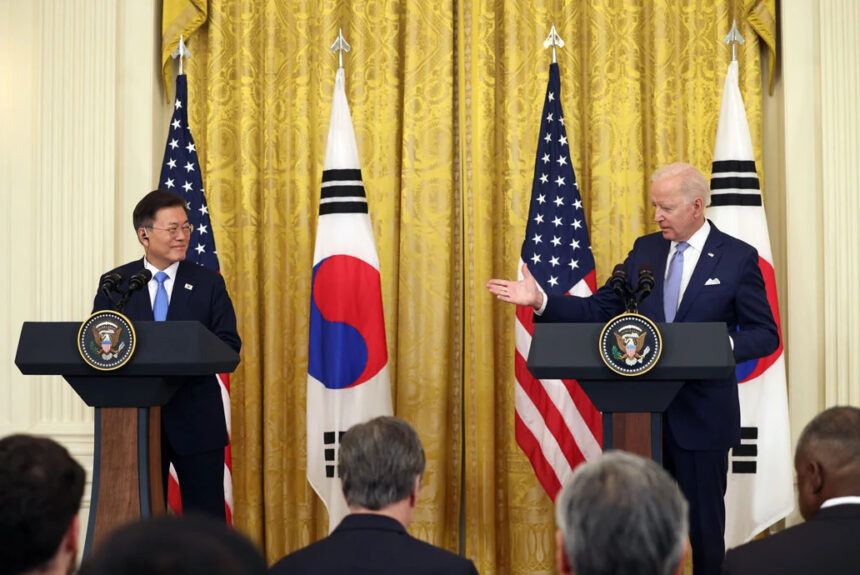This week, the Republic of Korea (ROK) President Yoon Suk Yeol is conducting an official state visit to Washington, DC to celebrate the 70th Anniversary of the US-ROK Alliance and the history of strong US-South Korea relations. The importance and timeliness of this anniversary are unsurpassed.
In a world that is increasingly dangerous: there is a civil war erupting in Sudan, Putin’s war against Ukraine raging on with no end in sight, and China’s Xi Jinping continuing to methodically make efforts to create a new world order in his image, to name just three threats, South Korea plays a critical role in the future of the free world.
>>>READ: On Climate, the U.S. Should be Tough on China
Since the end of World War II, US-South Korea relations have been strong. Free trade has been a big advantage of our relationship. The U.S. Trade Representative notes that $154.9 billion in goods moved between our two countries in 2020. The Commerce Department says that this trade supported an estimated 358,000 jobs in 2015. Our countries have a Free Trade Agreement, which benefits Americans, in part, by protecting intellectual property rights and preserving access to Korea’s $580 billion services market.
An often-overlooked foundational pillar to this, and any, free trading relationship is the need for secure and reliable energy supplies. With energy security in hand, we can and should strive for a cleaner energy future. Without energy security in hand, our very freedom to survive and prosper is in danger.
Consider Europe in early 2022. Before Russia invaded Ukraine, more than half of the natural gas used in Germany came from Russia. Moscow clearly thought that its energy exports gave it a measure of national security. It could invade a neighbor, and European democracies would have to give in because they needed its fossil fuels. When Western governments criticized the invasion and stepped in to support Ukraine, Russia tried to punish them by slashing its energy output.
That backfired. Germany, for example, moved quickly to install Liquified Natural Gas terminals so it could import gas from further away. Germany now brings in LNG from overseas. As NPR reports, the U.S “has become Europe’s largest source of LNG.” Germany’s national security is protected by American natural gas imports traveling by sea.
Overall, Reuters reports that: “the EU has replaced a large chunk of imports from Russia with alternatives, and set aside enough gas to be in a strong position to prepare for next winter, although risks remain.” The entire bloc is recognizing that its national security, and thus its ability to resist Russian aggression, relies on energy security.
Much of the planet’s energy is traded across borders. Oil is produced in Asia, Africa, and South America as well as here in North America. Sometimes it makes more sense to export light crude from Texas and import heavier crude from Canada and South America, because American refineries are often set up for the heavier grades. Meanwhile, LNG produced by American frackers is keeping the lights on in Europe and elsewhere. This trade is expanding, even as the United States produces more energy than ever. The goal isn’t energy independence, but energy abundance, everywhere.
>>>READ: Free Economies are Clean Economies
International trade allows different places to specialize in different things. South Korea can focus on high-tech manufacturing of computer chips, phones and electronics, even though it does not produce the raw materials that go into those products. Specialization creates a virtuous cycle that works for everyone’s benefit. But that also requires energy and national security.
Without energy, trade is impossible. Without secure supply lines, raw materials and finished products can’t move in and out of countries to get from the source to the consumer.
South Korea is now a big player, helping promote international stability. “South Korea plays a leading role in securing its own defense and is a rising contributor of public goods in the areas of peacekeeping, overseas development assistance (ODA), and postconflict stabilization,” writes the Council on Foreign Relations. “As a leading player in the global economy, South Korea has the capacity to shape its own interests instead of being subject to the whims of neighboring powers.”
International trade and investments are also crucial as the world strives for a cleaner energy future. It’s good for energy security and the environment when South Korean companies like Hanwha invest billions of dollars to expand their US solar panel manufacturing facilities. The alternative is that we let China continue to dominate the global market, which is not good for energy security or the environment. Therefore, Washington must prioritize maintaining strong US-South Korea relations.
For the U.S. and our allies such as South Korea, energy security is national security. We need to keep expanding our supplies to provide a better, more secure energy future for everyone, everywhere.
The views and opinions expressed are those of the author’s and do not necessarily reflect the official policy or position of C3.
